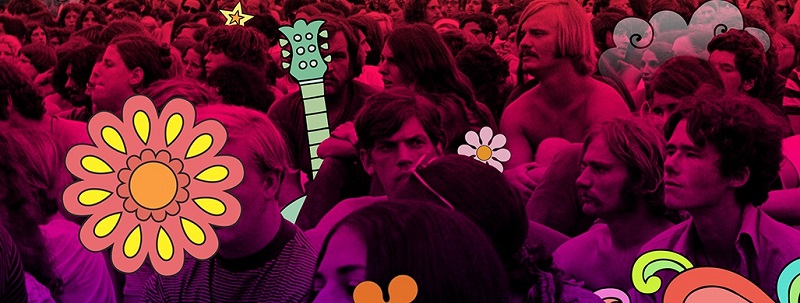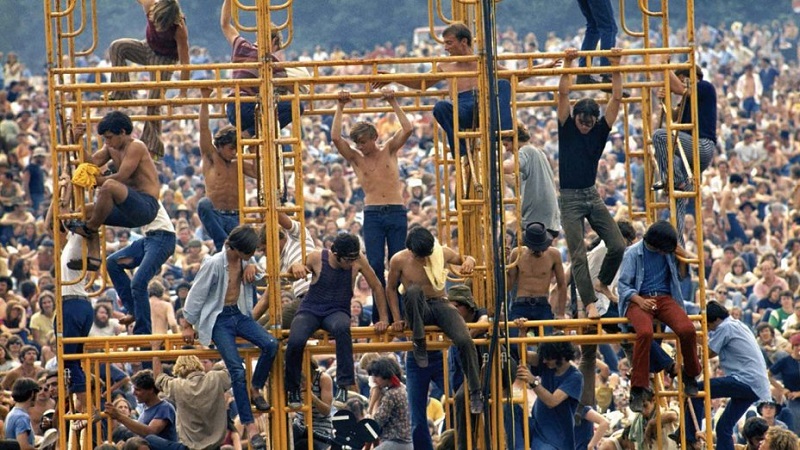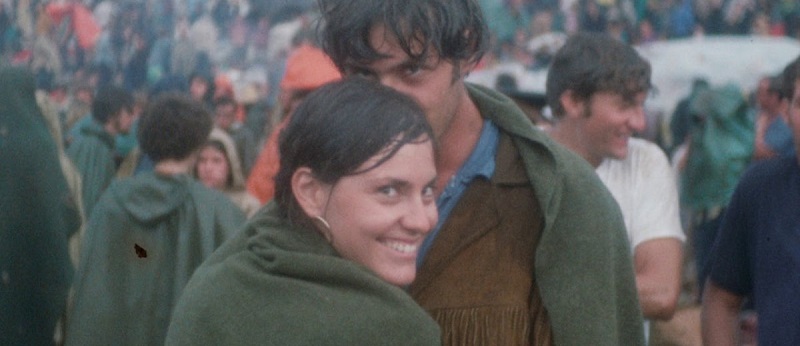The documentary Woodstock: Three Days that Defined a Generation is a stunning look at a music festival that most of us feel we already know. What with the 1970 Oscar winning documentary Woodstock existing, one may think that is all we need. That film chronicled just one part of the once-in-millennia event. Director Barak Goodman (and co-director Jamila Ephron) went behind-the-scenes and spotlighted the men who put on the concert and all of their troubles and tribulations, as well as turn the camera on the crowd itself and the miracle that was that weekend festival in August of 1969.

The Movie Mensch spoke to Goodman exclusively over the phone and was beyond impressed with the gumption to tackle a documentary than even partially shares the name of one that is so engrained in our society, but to also frame it in such a way that it triumphantly, enlighteningly and wholeheartedly entertains us to the ninth degree.
Woodstock: Three Days that Defined a Generation earns its title in a myriad of ways. It is a sublimely put together documentary that does give us some of the musical acts, sure, but this doc delves deeper. Woodstock was essentially a concert film. Woodstock: Three Days that Defined a Generation is a true chronicle of not only what happened in upstate New York in the summer of ’69, but everything that occurred between and outside the lines of history.
Check out my raving review of Woodstock: Three Days That Defined a Generation!
The Movie Mensch: First, congratulations on a stunning piece of work. I promptly inhaled it and told everybody I knew to watch it. Including a buddy of mine who was there.
Barak Goodman: Wow.
The Movie Mensch: That leads me into my first question. With so many avenues that you could have taken with the subject, how did you settle on the angle you chose for the doc? There are countless ways to approach this topic and I love what you did that set it apart from other works that chronicle Woodstock.
Barak Goodman: You start with the original 1970 documentary, which is a concert movie that pretty definitively told that side of the story. What was music like at Woodstock? What were the acts like? But to us that didn’t answer the bigger question, which is why did this event become the iconic event of the 1960s in terms of the counter-culture? What was it about Woodstock that made it Woodstock? The answer to us wasn’t really the music and the performances, which is great as they were, were not that different from other concerts at the time. Whatever that was, it was out in the crowd. So, we decided that’s the story we have to tell. Then the question was could we tell it? Would we have the archives, the footage, to be able to tell that story in the film? We didn’t know that until we began working with Warner Bros. to get the optics from the original documentary, which comprised 90% of the footage that we see in the part of the film that deals with the concert itself.
The Movie Mensch: What surprised you the most when you dove into the research aspect? Something you never would have expected to learn about that festival.
Barak Goodman: I didn’t realize how on the edge the festival was almost from the word “go.” The legend of Woodstock is that 450,000 people showed up at Yasgur’s farm. They lose their original site, for example. With a month left before the festival, they had to rebuild the entire site. From the very word “go,” this thing seemed cursed. One thing after another happened. They couldn’t get the fences up, obviously. They then had to declare it a free concert. They didn’t have enough food or water. They didn’t have enough security. They didn’t have enough anything to deal with this, what became the third largest city in New York in one weekend. I didn’t realize how perilously close to chaos this thing was every minute of that festival. That, to me, was the story. That was the magic. Whatever happened out there, the little miracles that happened that got them through, ended up saying something about that generation and that time, that was very important. That’s what I felt it needed to be about.
The Movie Mensch: It’s really striking to me watching your documentary, and you just touched on it. We have the Fyre Festival and what a mess that was.
Barak Goodman: Yes!
The Movie Mensch: Because it was just such a mess. It reminded me that we’re talking about two different swarths of people. You have people nowadays with the Fyre Festival that were really, honestly, about greed.
Barak Goodman: Absolutely.
The Movie Mensch: What you chronicle with Woodstock, it was about the community. It was about the group that was comprised of 450,000 people.
Barak Goodman: Yup.
The Movie Mensch: You think that’s a safe assumption and statement on my part?
Barak Goodman: You nailed it. That is the story. We could have had Fyre times ten out there, or times a hundred. We had 450,000 hungry, tired kids, as much isolated as the kids who went to Fyre. They were cut off from the world. They didn’t have phones. They didn’t have any connection. Instead of it devolving into violence and chaos, there wasn’t a single fist fight that I could [gather] out of anybody. Yet we had Altamont a month later where people died. I think the reason for that started at the top. It started with the organizers, the four young kids, really. They were mid-20s at most. And their realization very early on that … it had started about money to begin with, it was a capitalist enterprise. But pretty early on, they gave up on that idea. They were willing to see it through anyway, even if it meant bankruptcy for themselves. And it did mean bankruptcy for them. But they realized there was something bigger happening. I think they were infused by the spirit of the times, as much as anybody.
The Movie Mensch: Is that why they are essentially the main “characters?”
Barak Goodman: Yes, that’s why we made them the main characters in the film. [It] is their transformation from what we would call today, yuppie capitalists, into something else. Something bigger about the values of the time, idealism, communitarianism. That, to me, was what made Woodstock special. I don’t know that it could happen today. Because I don’t know that that ethic and those values are as prominent today as they were then. I think it really is what defined that generation. That’s why we called the film what we called it. Because it did define a very special quality in that generation.

The Movie Mensch: I love the way that you went back to the origins, its influences. Those gentlemen that were trying to put it together. You kind of touched on it, but in hindsight are you honestly surprised that this thing even got off the ground?
Barak Goodman: Oh my God. It’s a miracle it got off the ground. So many times, you could see it being shut down. Being shut down by the organizers themselves or by outside forces. The National Guard was almost called several times. They really thought this was a disaster in the making. They thought they might have multiple deaths at this event. [New York] Governor Rockefeller had to be persuaded by one of his own staff members not to send in the National Guard to clear the place out. So yeah, it is a series of little miracles that happened out there. Starting with security. People may not remember that instead of cops and guards and arms folks, they hired a commune called the Hog Farm to do their security, and Wavy Gravy at the head of it! It was stuff like that that made Woodstock so special. When they were starving and out of food, the surrounding communities—which were conservative Republican little towns in upstate New York—rallied together. They got all the food out of their pantries and brought it by helicopter to the event, to feed the kids. Again, stuff like that just doesn’t happen outside the movies. Yet it happened here, and that’s what made Woodstock so special.
The Movie Mensch: Something that also struck me about your documentary is the first acts that were tapped to play, that you show, really fed this narrative that would permeate through the entire weekend. I love how you touched on those acts and how they kind of really calmed the crowd and got them unified.
Barak Goodman: Everyone had to step up. Everyone knew that they were in an emergency situation. Everyone knew they had to step up. The very first act kind of personified this. That’s Richie Havens. Richie is the only guy available. None of the music acts could get in. It was cut off. The traffic had been so bad that the only way the music acts could get in was by helicopter. They had to step that up and set everything up. So, the only person available to start the concert was Richie. They said to him, “Please go on.” He said, “I’m not ready, I don’t have my bass player.” They said, “Please go on.” He did. He went on. He ran out of music after two hours. They still needed him to play, so what does he do? He made up a song on the spot called Freedom. It ended up being the most famous song he ever played. It captured the spirit of the festival, that one song. You see 350,000 people, on our film, you see them rise up together to respond to this spontaneous piece of music that Richie creates on stage. By the time he’s done and wrung out the sweat … finally, they’ve got the helicopters going back and forth. This kind of thing happened over and over and over again throughout the weekend—people stepping up way beyond their comfort zone to keep this thing from slipping into disaster. It’s really an amazing story.

The Movie Mensch: Yeah, it really is. It might be really, really hard for you, but if you had to choose one moment from the fest that is portrayed in your documentary that was indicative of the entire experience, what would it be?
Barak Goodman: It is hard, because there are a bunch of them. But I love the moment that Max Yasgur, who was of course the owner of the property—the conservative Republican dairy farmer who began to sort of defy his neighbors and just said, “We’re going to have a festival here whether you like it or not.” It’s Sunday afternoon, everybody is exhausted. Everybody is hungry and tired and wet and muddy. Max comes to the stage. He says, “I’ve never talked to more than 20 people at a time, and here you are, 400,000 people.” And he blesses them. He says to them, “You’ve proven to me, to the world, that you came up here for exactly what you said you were coming up for, peace and love.” It was a tremendously emotional moment. Here was a representative of the older generation, who normally looks down on them, and is instead saying, “You guys are worth something. What you’re doing is worth something. What you’re feeling, these are all good things. Keep it up.” To them, it was an extremely meaningful moment and I love that moment in the film.
The Movie Mensch: Yeah. I do too. I’m really thrilled you chose that one. You look at their trying to get a 50th anniversary concert off the ground, and it just seems to keep running into a wall. Do you think that because this was such a unique experience, that all kinds of efforts to recapture it, even in the most altruistic, celebratory ways, are destined to kind of fail?
Barak Goodman: It’s a great question. In a way, yes. I’ve no doubt that they can pull together, whether it’s this one or anything else, a good music concert. But they’ll never be able to recapture what happened at Woodstock, and I don’t think they should try. I think they should call it something else, frankly. It’s trading on a name that … it doesn’t necessarily cheapen it, but it promises too much. Because you’re not going to get another Woodstock. You can’t. If you planned for it, it’s not going to happen. What happened at Woodstock happened because it was spontaneous. Because it was people pulling together under the toughest of circumstances and being with each other and for each other. You can’t engineer that, so you shouldn’t try to engineer that. By all means commemorate it with an anniversary concert. I hope that thing happens up there in upstate New York. But don’t go there expecting to have another Woodstock, because that’s not going to happen.

